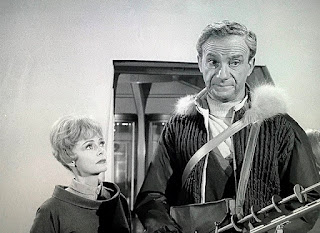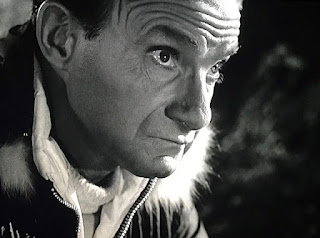We have the gift horse, let us not examine its mouth too closely."

-Dr. Zachary Smith-

Greed is the root of all evil. Just as John Robinson declares, "like most people it wasn't enough for him," noting Dr. Zachary Smith "had to have more."
In Lost In Space, Season One, Episode 11, Wish Upon A Star, not only is Dr. Smith lured by the wondrous enticement of this wishing machine or thought translator or the Lost In Space version of the Aladdin's Lamp as Penny calls it, but the entire family is marched down the rosy path of this alien device's many promises and it affects and influences the judgment of all on the planet.
The idea of greed's impact on humankind dates back centuries. One perfect literary example is The Pardoner's Tale, one of the tales from Geoffrey Chaucer's The Canterbury Tales (1387). It's decaying effect on man is undeniable, which explains why the weak-minded Smith would be less than enthusiastic to lend self-examination to the conundrum that befalls the Robinsons and company.
This powerful theme has been revisited time in memoriam in literature, television and film. Think of the horrors that would await those with the cube or puzzle box in Clive Barker's terrifying Hellraiser (1987).
Still, Wish Upon A Star is a more akin to the morality plays in a traditional sense. Writer Marc Cushman summarized the entry insightfully in Lost In Space: The Authorized Biography Of A Classic Sci-Fi Series Volume One noting the episode "has it all - ... and a moral" calling it a "1965 television equivalent to an Aesop's Fable." He correctly notes John Robinson as a "symbol of wisdom," which is indeed the burden he must carry throughout the series as the family patriarch and head of the mission. The opposite extreme is held by Dr. Smith who Maureen Robinson notes has no understanding of "moral integrity." Yes, the drumbeat of greed goes on and is captured here to great effect in this morality play remastered nourish black and white for a future outer space tale dubbed nicely as Wish Upon A Star.
Smith never falls short of word play. His character would become such a wordSMITH (pun intended) through the series. "You're wish is my command," he declares announcing the running theme of the episode in its very opening moments first heard in the epilogue of The Sky Is Falling (E10). He also speaks the now famous line "Never Fear Smith Is Here" in the final moments of both the last entry and this entry though author Marc Cushman notes in his book Lost In Space: The Authorized Biography Of A Classic Sci-Fi Series Volume One this is the first time Harris utters the now iconic phrase. But this may or may not be unofficially the third episode in which it appears.
Through it all Professor John Robinson remains the steady, calming, parental voice of reason espousing the ethical and moral dilemmas the device consistently presents the family. It continues to compromise principles and sow seeds of discontent and distrust.
The episode is notable for establishing a "bonding" between Smith and William Robinson as noted by Cushman. Will professes, "I know he was always doing things that were wrong, but underneath, I like him that's all." It is quite clear from the empathetic eyes of Will during Smith's exile he is quite concerned for and even attached to the man. Will notes to Major Don West in the opening minutes that Smith has some "good qualities" despite West's protests to the contrary. Will is also keeping secrets with Smith over the alien device. Smith identifies with the child-like persona of Smith. Conversely, Smith too, though cowardly, has a certain soft spot developing for Will and it is evidenced here to the greatest extent to date. It is this relationship that would be so downright entertaining over time and keep eyes glued to the screen for three complete seasons. Cushman notes "the bonding between these two characters happens here." Will would inevitably become Smith's greatest proponent and the two along with Robot would forge the true triumvirate of the series. They would be to Lost In Space what James T. Kirk, Spock and Dr. Leonard Bones McCoy would be to Star Trek (1966-1969).
Though Wish Upon A Star shines for the Smith and Will characters, Judy and Penny along with Professor Robinson get to share some real highlights here for another fine ensemble tale.
Wish Upon A Star was Barney Slater's first full writing assignment. His work here earned him a spot with Herman Groves on the previous The Sky Is Falling, which of course aired first. And as always Irwin Allen had a hand in scripting suggestions.
Wish Upon A Star is another shining, sparkling Season One beauty and genuinely entertaining many decades on. In keeping with the discovery of the wish machine Cushman called the entry "a true treasure." Which of us in this life hasn't dreamed of the possibility of a wish machine? This is the kind of science fiction that brings all of that fantasy to life in colorful ways yet accented in gorgeous black and white film.
Writer: Barney Slater. Director: Sutton Roley.




































No comments:
Post a Comment